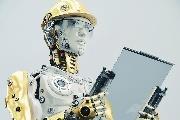Firm adds that construction sites will be largely human-free in the future

Balfour Beatty is predicting that construction sites will be human-free by 2050.
Teams of robots will be building complex structures while other elements of builds will self-assemble, the contractor forecasts in a new report called ‘Innovation 2050: a digital future for the infratsructure industry’.
The country’s biggest builder said it expects drones will hover over construction sites collecting information and sending instructions to robotic cranes, diggers and automated robotic builders.
Humans no longer needed on site will occupy overseer roles, remotely managing multiple projects accessing 3D and 4D visuals and data from the on-site machines, ensuring the build is proceeding to specification.
Any humans requiring access to sites will suit up in robotically enhanced exoskeletons rather than hard hat, hi-vis and boots, and will use neural-control technology to move and control machinery and other robots on site.
Robots already perform complex tasks in factories while in domestic homes there are voice-activated technologies and autonomous vehicles are in the works; BIM is meanwhile becoming standard within the construction industry.
Technology, Balfour argues, has already revolutionised life to such an extent that radical changes in construction are not unimaginable.
Leo Quinn, the firm’s chief executive, said: “We are experiencing a digital revolution, redefining how we as an industry operate; becoming faster, better and more agile. By adopting and embracing the rise of digital solutions we are more able to deliver efficient, effective and safer solutions to our clients and customers.
“These changes will mean we have to ensure our industry trains our current and future employees with the skills to exploit the use of new technology, new materials and new methods of working.
“Balfour Beatty has made significant progress in its vision to become a truly digitally empowered business, developing our internal capabilities, collaborating across our supply chain and partnering with the best technologically creative minds enabling us to be bold in the adoption of new and emerging technologies.”
The firm said robots in construction will be beneficial in upping productivity levels, as well as solving skills shortages, increasing efficiency and removing health and safety dangers.
Driving this evolution of the construction industry is the increasingly complex infrastructure projects being commissioned by countries attempting to stimulate growth and the need for more and more new infrastructure to cope with fast-growing populations and ongoing urbanisation, according to Balfour, as well as the increasing expectations of businesses, service users and the public, and the need to reduce carbon emissions and waste.
Looking beyond the humanless construction site, Balfour also predicts that the Internet of Things, known as Industry 4.0, will power smart buildings built with new, self-healing, energy generating or breathable materials, while entire buildings could be 3D-printed.
However, Balfour does warn that digitisation comes with inherent risks, such as cyber attacks, while the high levels of energy required by increased data usage and storage will begin to have a significant impact on resources within the next decade.




























No comments yet